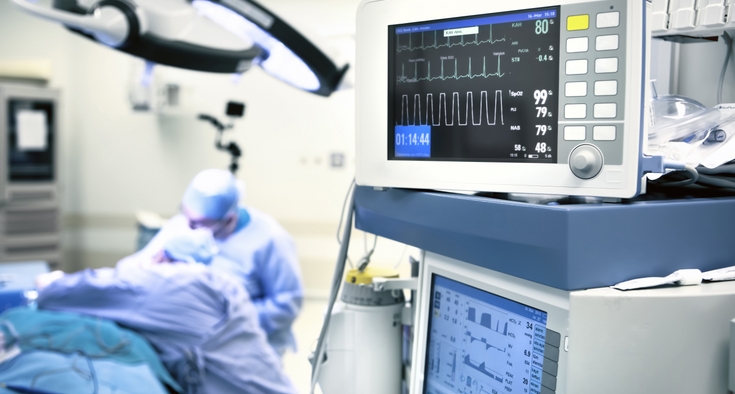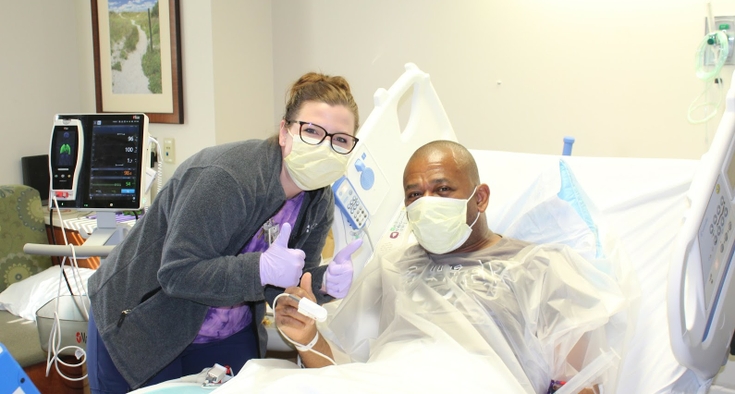The logistics of scheduling medical appointments may seem like a relatively humdrum part of health care. But it turns out that the complexities of patients’ lives, their personal preferences, availability of supplies and staff can quickly combine to cause a lot of different challenges. And those hurdles can lead to longer wait times, fewer appointment choices or other disappointments.
Novant Health aims to streamline this process with a leading-edge technology known as iQueue. Created by software company LeanTaaS, iQueue brings a mathematical approach to scheduling that maximizes the number of people providers can care for, while best utilizing limited resources like infusion chairs and operating rooms.
“The early results have been very promising,” said Ryan Neaves, vice president of care products at Novant Health.
Utilizing purposeful innovation is a core strategy at Novant Health to advance care and meet the individual needs of patients. Other recent examples include stroke care that harnesses artificial intelligence for faster care, the use of drones to deliver medical supplies, and a high-tech concept that creates an audio recording of an office visit, allowing doctors to keep personal focus on the patient.
iQueue in the infusion center
“What every infusion center struggles with is that crunch time in the middle of the day where there’s a really high patient volume,” said Lisa Rioux, nurse manager for outpatient oncology infusion in Charlotte. “During these peak times, there is a bottleneck of patients waiting to get their infusions started and the nurses are so busy they may not even have time for lunch.”
iQueue helps solve that midday spike in appointments. Instead, patients are scheduled at a steadier pace throughout the day, creating less wait time and making nurse burnout less likely. This also allows the infusion center to see additional patients.
Most importantly, iQueue benefits patients in reducing wait time at the Novant Health Agnes B. and Edward I. Weisiger Cancer Institute in Charlotte where this technology is being piloted. The infusion center waiting room was intentionally designed to be small and iQueue streamlines how quickly a patient is seen. The software is also being used at the infusion center at Novant Health Presbyterian Medical Center and other locations will follow.
Rioux said the long-term goal is to ensure that a patient doesn’t wait longer than 15 minutes from the time they check in to when they start their infusion. In the past, this wait time has hovered around 45 minutes to one hour. While all Novant Health facilities are safe and multiple steps are taken to ensure patient safety, less wait time also equates to less exposure for cancer patients who are immunocompromised.
On the team member side, iQueue has been a “huge time saver” for clinical coordinators who schedule appointments. Rioux said time coordinating a nurse’s assignment has been reduced from as much as an hour and a half down to about 15 minutes.
iQueue in the operating room
This machine-learning technology is also being utilized in operating rooms at Novant Health Presbyterian Medical Center, Novant Health Forsyth Medical Center and Novant Health Brunswick Medical Center.
Scheduling surgeries can be a complicated process as many variables need to be considered – including patient preferences on appointment time, availability of operating rooms, what support staff is needed and if the necessary supply chain elements like clamps or sponges are in stock.
“In the past, our employees needed to account for hundreds of different variables,” Neaves said. “iQueue appealed to us because an algorithm can solve all the different points of calculation.”
As more data is collected, iQueue gets more sophisticated in what it should look for. This is known as artificial intelligence – the ability of a computer program or machine to think and learn.
“The algorithm begins to learn that after a particular surgery, it takes 30 minutes to prep the room and have it ready to go for the next procedure,” Neaves said. “It also considers how long it takes each physician to perform the surgery. As the algorithm gets more dynamic, it will show us where we can gain some efficiencies and we’ll be able to operate on more patients.”
In addition, patients can schedule appointments faster than in the past. Kim Combs, manager of surgical support in Charlotte and Winston-Salem, said iQueue eliminates the need for a back-and-forth between schedulers and the patient.
“In the past, the clinic scheduler would need to call the surgery scheduler, which slows down the process for our patients. iQueue automatically factors in when an operating room will be free and it’s an incredibly efficient way to grab up open time.”
Patients now know when their surgery will be prior to leaving the office, avoiding unnecessary follow-up calls and allowing them to better plan ahead.
‘There’s opportunity for us to use this in other areas’
iQueue is also being used in some Novant Health ambulatory surgical centers in Charlotte and Winston-Salem, which facilitate same-day surgeries. Because these surgeries are less complex than what is performed in a Novant Health operating room, they perform more surgeries per day. iQueue will allow them to schedule more efficiently, helping even more patients.
Neaves also spoke to some of iQueue’s future potential at Novant Health.
“We've been talking with our leaders to figure out how to roll this out to a broader audience in 2021,” Neaves said. “There’s opportunity for us to do the same things in other areas. I think radiology is a good example of that. Magnetic resonance imaging (MRI) machines are very costly and scheduling that resource more effectively is really beneficial in recuperating that cost.”









